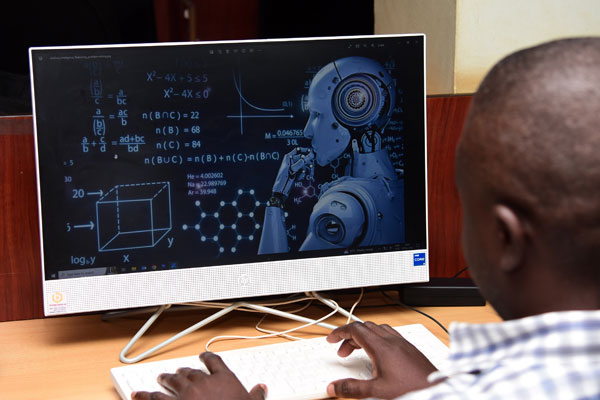Senior workforce faces challenges adapting to AI

A man researches about Artificial Intelligence at a workstation in Kampala on December 19, 2023. PHOTO/FRANK BAGUMA
What you need to know:
- Addressing concerns about AI-induced job displacement, a human resource specialist said this is not entirely the case.
John Mukasa, 52, a seasoned accountant, recently attended a company training workshop focused on adapting to change in the age of Artificial Intelligence (AI). While the workshop aimed to equip the team with AI skills to improve productivity, Mukasa is struggling to adapt to the overwhelming pace and complexity of the technology.
AI is a field of computer science focused on creating intelligent machines that can mimic human abilities, including language comprehension, pattern recognition, and decision-making. With the advent of mainstream AI applications like ChatGPT, the technology is rapidly reshaping various aspects of work.
“There is so much going on with technology nowadays,” Mukasa said.
He added: “There are so many layers to this [AI] technology that I am still trying to grasp and even apply to my day-to-day work.”
Generational divide
Older workers find adapting to AI more challenging than their younger, tech-savvy colleagues in the country’s workforce.
According to data from the Organisation for Economic Cooperation and Development (OECD), Uganda has a young population of nearly 71 percent under the age of 35. Workers aged 55 and older constitute 41.1 percent of the workforce in 2022, indicating that Uganda has a large and growing pool of young talent.
Ms Jane Namubiru, 56, an administrator, expressed concerns about the overwhelming pace of technological advancement and the pressure to adapt.
Despite her aversion to technology, she recognised the need to understand AI to remain competitive in the workplace and to avoid potential job loss.
“It is at times overwhelming keeping up with everything associated with technology,” Namubiru said, “And now with AI, the pressure to keep up is even double. I have to read material on how this whole thing works, yet I don’t have time like the younger staff. I have a family to look after, and my eyesight is already poor.”
While the Labour ministry lacks readily available statistics on AI’s current workplace penetration, the 2023 McKinsey Global Survey on AI sheds light on the generational divide in AI adoption. Exposure to generative AI tools like ChatGPT, is higher for younger generations, with 51 percent of those born between 1981 and 1996 using it regularly.
AI disruption
The 2021 Makerere University’s Artificial Intelligence Capacity in Sub-Saharan Africa – Compendium Report underscores AI’s vast potential and transformative power. However, it also warns that AI’s rapid growth could surpass human capabilities, posing risks to job security across various industries and regions.
Experts who spoke to Monitor acknowledge the challenges posed by AI.
Frank Mugabi, the spokesperson of the Ministry of Gender, Labour, and Social Development, emphasised the pervasive influence of AI across all sectors of society and the need for individuals and organisations to embrace it to remain competitive.
“It does not discriminate,” Mr Mugabi said, highlighting the universal impact of technology. “But that is technology, and we all need to adapt or ride on the back of the technology to sustain our livelihood.”
He further emphasised the necessity of embracing AI, especially for businesses.
“If you are a company and not embracing AI, you will not manage the competition because guys will be ahead of you.
There is no way around it; this technology is here, and we need to move with it,” he added.
Bridging the gap
To bridge the generational divide, Mr Daniel Mutembesa, a research fellow at Makerere University AI Research Lab, suggests incorporating AI into familiar technology solutions like WhatsApp, a widely used messaging platform. This approach could make AI more accessible and less intimidating for older workers.
Addressing concerns about AI-induced job displacement, human resource specialist Julia Kushemererwa Singa said this is not entirely the case, instead advocating for proactive government regulation to harness AI’s potential while safeguarding employment opportunities.
“Clearly, even when we moved from very labour-intensive work to computers, some people lost jobs. But the opportunity also created other jobs,” she said.
Certified HR professional Joseph Ajal emphasised the impact of AI, citing healthcare, education, transportation, and legal industries as prime examples. He urges companies to invest in AI research and development to harness its full potential.
“The trick is not to fear AI but to embrace it and get the most benefits out of it. Either disrupt or be disrupted. For example, doctors can learn to use AI in diagnosis and pinpoint treatment of ailments,” Mr Ajal said.
This reporting was supported by Thomson Reuters Foundation




